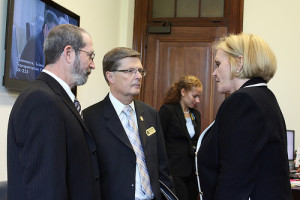 Postal Service in Hot Seat as McCaskill Aims to Protect Rural Delivery for Missourians
Postal Service in Hot Seat as McCaskill Aims to Protect Rural Delivery for Missourians
Senator questions whether Postal Service is operating efficiently compared to UPS, FedEx, has capability for effective rural delivery
1/21/16 WASHINGTON – U.S. Senator Claire McCaskill today demanded answers from the U.S. Postal Service on how it will protect mail delivery for rural Missourians and efficiently manage the cost-sharing benefits with competitors to carry mail the “last mile,” especially in rural areas.
“We all know the last mile is one of the most important drivers of cost in our postal infrastructure—it is that last mile that’s very expensive,” said McCaskill, a former Missouri State Auditor and senior member of the Homeland Security Committee. “And so the notion that we’re doing business with our competitors for the last mile, to me deserves a great deal of scrutiny… these are who we have to beat to be successful as a Postal Service. And they’re fleecing us.”
McCaskill continued: “I think it’s really important we get a handle on [rural delivery times]. Those of us who are really pushing to protect rural delivery, I think it’s important we know what we’re working with from a data-driven basis.”
McCaskill, a longtime advocate for postal service in rural communities, is widely credited with having waged a successful campaign over several years to save rural post offices and maintain delivery times when faced with closures and the slowing of standards.
McCaskill recently backed the Rural Postal Act, a bill that aims to improve postal service, delivery times, and standards in rural communities that have been disproportionately affected by cuts to the Postal Service. The bill—sponsored by Senator Heidi Heitkamp of North Dakota and also cosponsored by Jon Tester of Montana—would restore overnight delivery, return a faster First-Class mail standard, make six-day delivery permanent, and enact strict criteria the Postal Service would have to meet before closing a post office to ensure that rural communities are still able to easily access the mail system.
Last year McCaskill requested an examination of the interaction between the lack of adequate access to broadband technology in rural areas and the reliability of Postal Service delivery. Without efficient and effective mail service as a result of recent Postal Service consolidations, rural Missourians are put at an economic and communications disadvantage, the effects of which haven’t yet been properly studied. McCaskill also recently signed on to a request for the federal government’s top watchdog to review the Postal Service’s calculation of delivery times and standards, and she helped win a one-year moratorium on postal closings until the impact of those closings is fully understood.